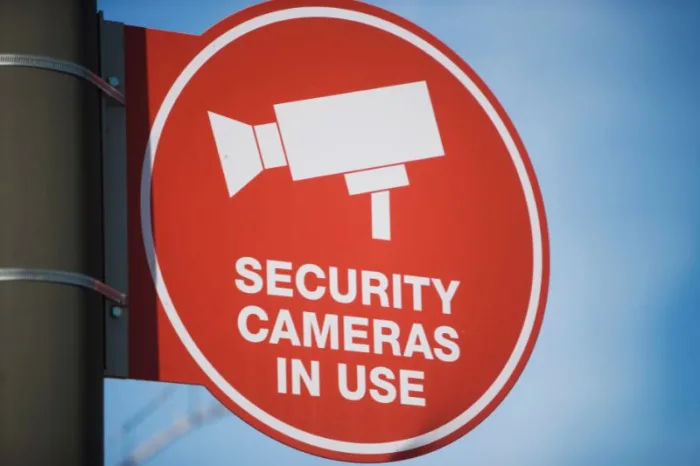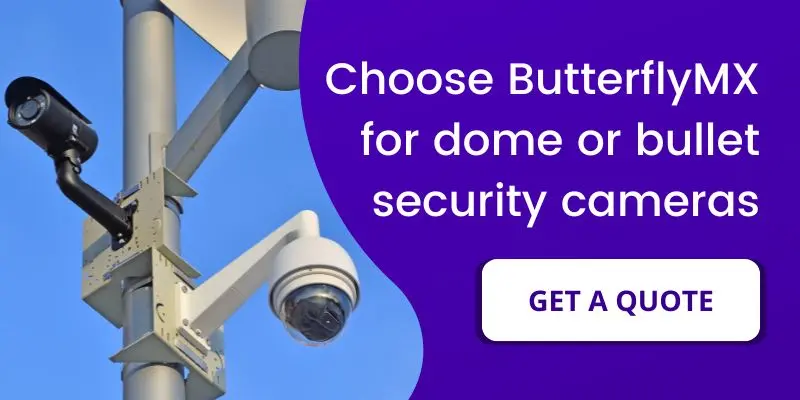Key takeaways:
- There is an overwhelming number of security cameras on the market, but we’ve created this simplified guide to narrow your search.
- When choosing a security camera system, consider factors like video quality, storage options, connectivity, and integration capabilities.
- Security cameras work by capturing video through a lens that focuses light onto a sensor that converts it into electrical signals before being processed into a file.
- To determine how many cameras you need, consider the layout of your property, identify vulnerable areas, and work with a professional installer.
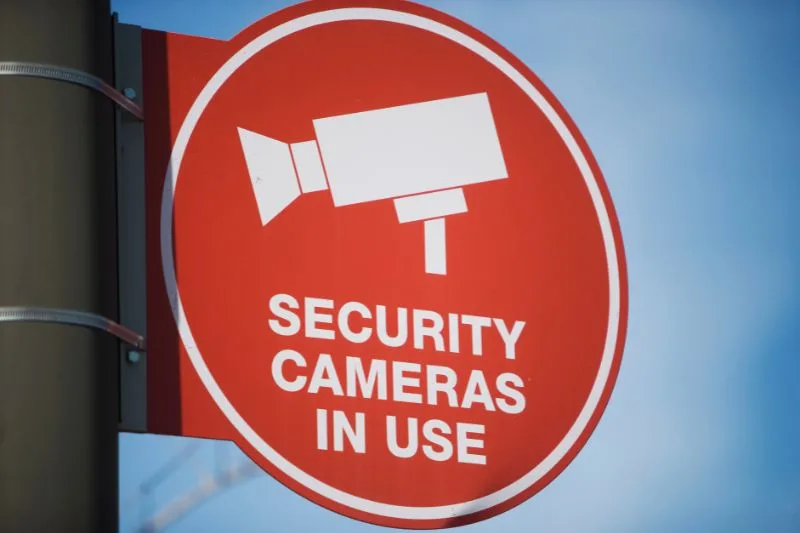
Security cameras play a pivotal role in protecting your business or apartment building. For instance, they can deter potential threats and provide peace of mind for you and your tenants.
However, when you shop for security cameras, you’ll find endless options.
So, we’ve put this guide together to jumpstart your search for the best solution. Read on to discover the best security camera systems for your commercial building.
This guide covers:
- 9 best security cameras for buildings
- How do security cameras work?
- How many security cameras do I need?
- Considerations for choosing business security cameras
- Security camera FAQs
9 best security cameras for buildings
Selecting the right security camera system is crucial for ensuring the safety of your business or apartment building. Fortunately, we’ve compiled a list of top-performing brands that offer features designed to meet your property’s security needs.
Here is a list of the 9 best security cameras for buildings:
1. ButterflyMX
The best security cameras for commercial and apartment buildings are ButterflyMX’s Dome and Bullet Cameras.
ButterflyMX is a leading access control company installed in over 15,000 buildings and earned over 40,000 five-star reviews. Our Security Cameras seamlessly integrate with our Access Control System, allowing you to manage access and review video footage from the same OS. This ability streamlines your duties and creates a unified security solution that is more effective at protecting your property.
Features of ButterflyMX Security Cameras
- 24/7 HD recording. Capture high-definition video footage throughout your property at all times of the day or night. That way, you won’t miss anything at your building, maximizing your security efforts.
- Night vision. Your cameras can capture activity occurring in low-light conditions with night vision capabilities, ensuring you have full coverage no matter the time of day.
- Weather and impact resistance. Both cameras are built with highly durable weather—and impact-resistant housing, making them suitable for indoor and outdoor applications. You can install your cameras anywhere throughout your property for comprehensive coverage.
- ONVIF compatibility. With the ButterflyMX Gateway, you can connect your existing cameras to our OS if they support the correct ONVIF firmware. In other words, mix and match camera brands to get the right security camera system for your property while still centralizing management through the ButterflyMX platform.
- PoE installation. The Dome and Bullet Security Cameras are easy to install with a single Power over Ethernet connection, eliminating additional wiring.
- Seamless integration. Integrate your Dome and Bullet Cameras with ButterflyMX’s other products: Video Intercom, Access Control, Elevator Controls, Vehicle Access Control, Smart Locks, and more. We even support a variety of third-party integrations to centralize your property management operations.
Watch how ButterflyMX works:
2. Rhombus
Founded in 2016, Rhombus is a modern cloud-based security camera solutions provider. The company emerged from a team with deep roots in enterprise IT and aims to simplify video security for businesses.
Rhombus offers a comprehensive range of AI-powered cameras and smart sensors to provide intelligent surveillance and data insights. Their product line includes dome, fisheye, and bullet cameras, all managed through a unified cloud platform.
Key features of Rhombus cameras include:
- AI-powered analytics. Rhombus cameras have built-in AI for proactive threat identification, real-time alerts, and advanced features like human detection.
- High-resolution video. Their cameras offer up to 4K resolution, with options ranging from 2MP to 12MP, depending on the model.
- Easy deployment. Plug-and-play setup allows for quick installation without the need for NVRs/DVRs.
- Integration capabilities. Rhombus cameras can integrate with other security systems and sensors, such as ButterflyMX.
- Remote access. Using the web or Rhombus mobile app, you can view and manage cameras from anywhere.
Read our Rhombus security cameras review >>
3. OpenEye
OpenEye is an established provider of video surveillance solutions for various industries, including retail, education, and healthcare. The company offers a hybrid cloud architecture, combining the benefits of on-premises and cloud-based systems. Its approach focuses on providing comprehensive security management tools alongside its camera hardware.
Features you’ll find with OpenEye’s cameras include:
- Analytic capabilities. Their cameras offer analytics to help identify people, vehicles, boundary crossings, and more.
- OpenEye integrations. Integrate OpenEye cameras with all of their other products, like recorders and web services.
- Indoor and outdoor options. Use OpenEye’s cameras inside or out with weatherproof designs that can withstand extreme temperatures.
- Camera variety. Choose from a variety of models, such as dome, bullet, turret, and fisheye.
- Hybrid storage options. Choose between local, cloud, or both storage options to preserve video footage as long as you‘d like.
Check out our OpenEye security cameras review >>
4. Swann
Swann is a global leader in DIY security solutions, known for offering affordable yet feature-rich camera systems suitable for both residential and small business use. Founded in 1987 in Melbourne, Australia, Swann has established itself as a reliable brand in the security camera market, providing easy-to-install products with professional-grade features.
The DIY security cameras from Swann feature:
- Night vision. Swann security cameras can capture video footage up to 150 feet in total darkness.
- Free local recording. Basic functionality includes free local storage recording with no monthly fees.
- Heat and motion sensing. Detect warm-moving objects like people or cars to reduce false triggers. This feature also supports push notifications when paired with an NVR.
- Easy installation. Some Swann models are PoE security cameras, simplifying installation.
- Voice commands. Some Swann cameras support voice commands from assistants such as Amazon Alexa or Google Assistant.
Check out our Swann security cameras review >>
5. Ubiquiti
Ubiquiti is primarily known for its networking products but has expanded its security offerings with its UniFi line. The company offers enterprise-grade security camera solutions that integrate with its networking ecosystem. Ubiquiti’s approach focuses on providing high-performance, scalable solutions for businesses of all sizes.
UniFi security cameras include the following features:
- Flexible mounting options. Cameras can be mounted on walls, ceilings, poles, or other surfaces, depending on the model, giving you greater control over where your cameras are installed.
- Sound recording. Some cameras include built-in microphones for sound-recording capabilities.
- Scalability. The UniFi system can support many cameras, allowing you to scale your surveillance needs.
- UniFi Protect. This software enables seamless integration between other Ubiquiti systems, such as a video management system, making it easier to set up and manage.
- Analytics. Some security camera models offer advanced features like motion detection and AI-powered analytics.
Read our Ubiquiti UniFi security camera review >>
6. Arlo
Arlo specializes in wire-free, smart security cameras for indoor and outdoor use. Founded in 2014 as a division of Netgear before becoming an independent company, Arlo has quickly become known for its high-quality, easy-to-use cameras that offer flexibility in placement and advanced features that small businesses and single-family homes have learned to love.
Security cameras from Arlo include the following features:
- Wireless security cameras. Many Arlo cameras are 100% wire-free, operating on rechargeable batteries for easier placement.
- Motion and audio detection. Arlo cameras enable you to create custom alert zones, notifying you of motion or audio in those areas.
- Long battery life. Some models, like the XL series, offer extended battery life up to six months between charges.
- 4G LTE connectivity. Certain models, like the Arlo Go 2, offer cellular connectivity in areas without WiFi.
7. Hanwha Vision
Hanwha Vision, formerly known as Hanwha Techwin, is a South Korean company that offers a wide range of professional-grade cameras suitable for demanding commercial environments.
Cameras from Hanwha Vision feature:
- Weather and vandal-resistant. High weather- and vandal-resistant housing to prevent dust, water, and tampering.
- Wide dynamic range. Up to 120dB WDR on select models, helping to balance bright and dark areas in the same frame for improved image clarity.
- Camera storage options. Optional on-camera storage options supporting up to 512GB
- Motorized varifocal lenses. Remote zoom and focus capabilities, with focal lengths typically ranging from 2.8mm to 12mm.
8. Axis
Axis Communications is a Swedish company that pioneered the shift from analog to digital video surveillance. Known for their high-quality, innovative cameras designed for professional installations, Axis offers a wide range of network video solutions catering to various industries and applications.
Security cameras from Axis include:
- Advanced video analytics. It features AI-powered analytics for object detection, facial recognition, and license plate recognition while also tracking detected objects.
- Imaging technologies. Cameras are equipped with Axis Lightfinder technology for high-quality color images in low-light conditions and a wide dynamic range for clearer images.
- Integration capabilities. Cameras follow ONVIF compliance for seamless integration with third-party systems.
- Specialized cameras. Axis offers numerous cameras designed for specialized environments, such as those with explosion protection, thermal imaging, and onboard cameras for vehicles or public transportation.
9. Hikvision
Hikvision is a Chinese multinational corporation specializing in video surveillance products and solutions. As one of the world’s largest manufacturers of video surveillance equipment, Hikvision offers a wide range of cameras suitable for various commercial and industrial applications.
You’ll find the following features with Hikvision security cameras:
- Video analytics. Includes AI-powered analytics for object detection, facial recognition, and license plate reading. Hikvision cameras can even perform object counting, detect activity in customized areas, and detect when objects are left or removed.
- Two-way audio. Some Hikvision camera models feature two-way audio, enabling you to speak with employees, guests, delivery drivers, and potential intruders.
- Storage options. Store video footage locally via a microSD card in select camera models or pair your cameras with an NVR for centralized recording and video management.
- Integration capabilities. Hikvision cameras are ONVIF compatible, meaning you can pair them with other security brands, such as ButterflyMX’s Gateway and OS.
How do security cameras work?
Security cameras operate by capturing images or video through a lens. The lens focuses light onto a sensor, which converts it into electrical signals. These signals are then processed into video files, which can be stored, viewed, or transmitted in real-time.
Depending on the camera type, footage may be transmitted via wired connections, WiFi, or IP networks, each offering different levels of quality and ease of installation.
Once captured, the video can be stored locally on devices like SD cards, on a Network Video Recorder (NVR), or in the cloud, allowing for remote access.
Many modern cameras also offer remote viewing through smartphones or computers and motion detection and alert features. Integration with other security systems, like alarms and access control, can further enhance your property’s security, providing a comprehensive and interconnected approach.
How many security cameras do I need?
It depends on many factors, but the most important includes your property’s size and layout.
Start by assessing your property’s size and layout. Larger areas with multiple entry points, such as parking lots, garages, and large offices, will naturally require more cameras. On the other hand, smaller properties may need fewer cameras but placed in critical spots to maximize coverage.
In addition, you should identify areas within your property that are vulnerable to potential intruders. These typically include entrances, exits, reception areas, loading docks, and secluded or poorly lit spaces. High-traffic areas where valuable assets are stored or where unauthorized access is a concern should also be prioritized.
Above all, you must consult a security system installer or integrator for the best security camera placement. Your professional installer will help you determine which cameras are right for you and how many you should install, giving you the best experience possible.
Considerations for choosing business security cameras
While we’ve provided you with a detailed list of the top security cameras on the market, they won’t all fit your security needs. Below are several considerations for choosing a security camera system.
Here is what you should consider when selecting security cameras for your business:
- Type of cameras
- Video quality
- Connectivity
- Storage
- Integrations
- Remote management
- Durability
- Budget
- Vendor reputation
Type of cameras
There are many security cameras, but it’s best to select multiple types for greater coverage throughout your property.
Here are the four most common types of security cameras used at multifamily and commercial properties:
- Bullet cameras. These cameras are designed for focused, directional coverage and are great for monitoring areas from a distance, such as parking lots, hallways, entryways, and outdoor perimeters.
- Dome cameras. For wide-angle coverage, dome cameras provide a more discrete form of surveillance. These cameras are built for indoor and outdoor use while still being less intrusive.
- PTZ cameras. Pan-Tilt-Zoom cameras provide a lot of flexibility for properties requiring dynamic surveillance. These cameras blend elements of bullet and dome cameras into one, enabling you to remotely pan, tilt, or zoom to capture more details in a dynamic environment.
- Turret cameras. Like dome cameras, turret cameras are also called “eyeball cameras.” Due to their compact design, they are commonly used indoors and are excellent for night-time surveillance because they are less prone to infrared glares.
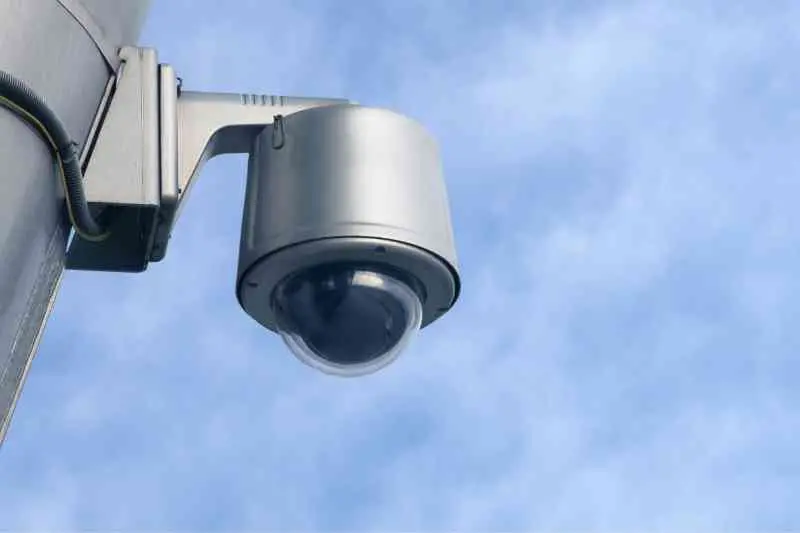
Video quality
High video quality is essential for identifying details like faces, license plates, and other critical information. Look for cameras with at least 1080p resolution for clear, detailed footage. If you require even finer details, consider cameras with 4K resolution.
Remember that higher resolution requires more storage space and better internet connectivity, so balance your needs accordingly. Also, higher resolution cameras will cost more.
Connectivity
Your choice between wireless and wired security cameras will impact installation, reliability, and scalability.
Wired security cameras offer consistent and reliable connections, as they are not subject to interference from other wireless devices. They are ideal for businesses where stable connectivity is critical and you don’t mind the more involved installation process.
Meanwhile, wireless cameras are easier to install and more flexible regarding placement. However, they may experience connectivity issues in environments with lots of WiFi traffic. These cameras require batteries you’ll need to charge or replace regularly.
Is it better to have wired or wireless security cameras?
It depends on what you need in a security camera.
You should choose wired cameras if you:
- Need a stable and reliable internet connection.
- Have a large property to cover.
- Prefer minimal maintenance.
- See security as your top priority.
Choose wireless security cameras if:
- You need flexibility in camera placement.
- Quick and easy installation is appealing to you.
- You own a single-family home or small business where scalability isn’t a factor.
Storage
Storage is crucial, as it determines how much footage you can save and how long. You can opt for local storage (e.g., DVR/NVR security cameras) or cloud storage (IP security cameras).
Local storage doesn’t rely on internet access, but it may be vulnerable to physical damage or theft. Cloud storage offers convenience and accessibility from anywhere, though it typically comes with recurring costs.
The best approach might be a hybrid system that uses both methods to ensure redundancy and flexibility.
Integrations
Modern security cameras often integrate with other systems, such as access control, alarm systems, and property management software.
These integrations allow for a more cohesive security and management strategy. Cameras tether footage to access events and provide real-time alerts to your management team. So, when selecting a camera, ensure it’s compatible with your existing or planned systems to maximize efficiency and streamline management.
Remote management
Managing and monitoring your cameras remotely is increasingly important, especially for businesses with multiple locations or a need for 24/7 monitoring. Look for systems that offer mobile apps or web-based interfaces for easy access from anywhere. This feature allows you to check live feeds, review recorded footage, and receive alerts without being on-site, enhancing your response time to incidents.
Durability
Durability is key if your cameras will be installed outdoors or in harsh environments. Look for security cameras that are weatherproof and vandal- or impact-resistant to withstand potential tampering. To identify these cameras, look for a high IP and IK rating (e.g., IP65 and IK10). These ratings will ensure your cameras can withstand the many elements alongside potential perpetrators.
Budget
Your budget will largely determine the type of security cameras you can purchase. However, it’s important to consider the cost of installation, storage, maintenance, and potential subscription fees for cloud services. These costs will give you a better understanding of what your security cameras will cost.
Vendor reputation
Choose a reputable vendor who offers quality products and reliable customer service. Research reviews, ask for referrals, and consider the vendor’s warranty and support options. A well-established vendor is more likely to provide ongoing support, software updates, and replacement parts, ensuring your security system remains effective for years.
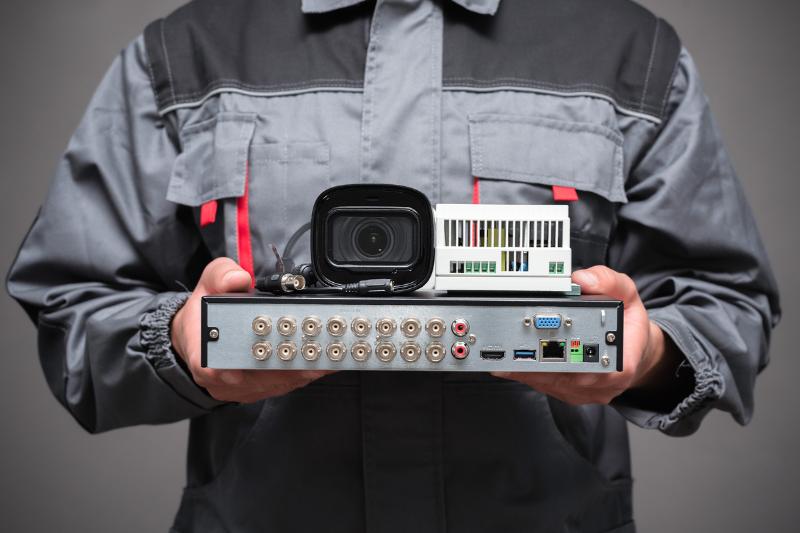
Security camera FAQs
- How long does the average security camera store footage?
- What is the highest security camera resolution?
- Can a tenant install security cameras?
- How much internet speed do I need for security cameras?
- What security cameras record 24/7?
- Do security cameras record sound?
How long does the average security camera store footage?
On average, DVR and NVR security cameras store footage for about 30 days, although storage can vary based on your system’s storage capacity, number of cameras, and quality of footage. Of course, the length of storage you need comes down to your security needs. Some highly-secure properties may store footage for months, whereas others only need a few days.
What is the highest security camera resolution?
Today’s highest security camera resolution is 8K (7680 × 4320 pixels). Despite this high resolution, 8K resolution cameras are not widely used and are generally reserved for specialized use cases where extreme detail is necessary.
Instead, 1080p to 4K security cameras are more common and provide excellent clarity for most business applications.
Can a tenant install security cameras?
Whether a tenant can install security cameras depends on the lease agreement and property management’s policies. Many tenants can install their security measures as long as they are not permanent fixtures.
With that said, some tenants must obtain permission before installing any security devices, especially if the installation involves drilling or altering the property. In other cases, property managers may prefer to handle the installation themselves to maintain uniformity and ensure compliance with local laws.
How much internet speed do I need for security cameras?
The required internet speed depends on the camera’s resolution and the number of cameras streaming simultaneously. For instance, a 1080p camera typically needs around 2 to 3 Mbps for smooth streaming.
What security cameras record 24/7?
Many PoE security cameras, such as ButterflyMX’s Security Cameras, record 24/7. Continuous recording ensures comprehensive coverage throughout your property.
Do security cameras record sound?
It depends on the security camera brand and model. Many security cameras have built-in microphones that allow them to record audio and video. However, recording audio can have legal implications, so checking local laws and obtaining the necessary permissions is important before enabling audio recording in your security cameras.
